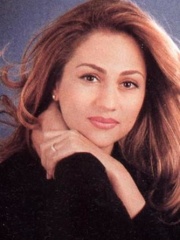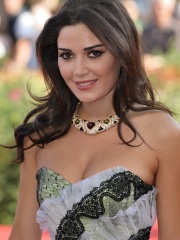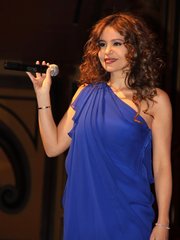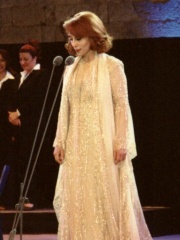
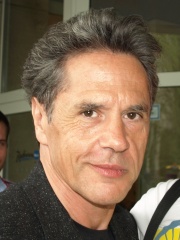
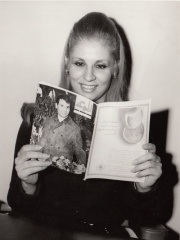
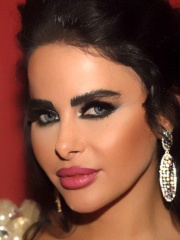
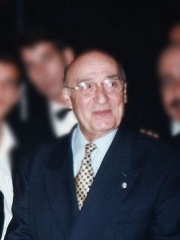
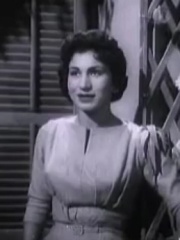
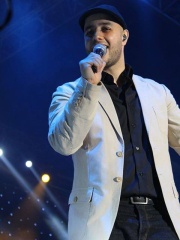
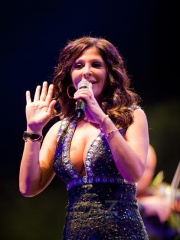
The Most Famous
SINGERS from Lebanon
This page contains a list of the greatest Lebanese Singers. The pantheon dataset contains 4,381 Singers, 21 of which were born in Lebanon. This makes Lebanon the birth place of the 45th most number of Singers behind South Africa, and Egypt.
Top 10
The following people are considered by Pantheon to be the top 10 most legendary Lebanese Singers of all time. This list of famous Lebanese Singers is sorted by HPI (Historical Popularity Index), a metric that aggregates information on a biography's online popularity. Visit the rankings page to view the entire list of Lebanese Singers.

1. Fairuz (b. 1935)
With an HPI of 72.84, Fairuz is the most famous Lebanese Singer. Her biography has been translated into 49 different languages on wikipedia.
Nouhad Wadie Haddad (born 20 November 1934 or 21 November 1935), known as Fairuz, is a Lebanese singer. She is widely considered an iconic vocalist and one of the most celebrated singers in the history of the Arab world. She is popularly known as "The Bird of the East", "The Cedar of Lebanon", "The Moon's Neighbor", "The Voice of Lebanon", and "Our Ambassador to the Stars", among others. Fairuz began her musical career as a teenager at the national radio station in Lebanon in the late 1940s as a chorus member. Her first major hit, "Itab", was released in 1952 and made her an instant star in the Arab world. In the summer of 1957, Fairuz held her first live performance at the Baalbeck International Festival where she was awarded with the honor of "Cavalier", the highest medal for artistic achievement by Lebanese president Camille Chamoun. Fairuz's fame spread throughout the Arab world in the 1950s and 1960s, leading her to perform outside of Lebanon in various Arab capitals, including Damascus, Amman, Cairo, Rabat, Algiers, and Tunis. Fairuz has received honors and distinctions in multiple countries, including Lebanon, Syria, Jordan, Palestine, Tunisia, the United States, Egypt, and France. Throughout her career, she headlined at the most important venues in the world, such as Albert Hall and Royal Festival Hall in London, Carnegie Hall, Lincoln Center and United Nations General Assembly Lobby in New York, the Olympia and Salle Pleyel in Paris, and the Odeon of Herodes Atticus in Athens. In a career spanning over six decades, Fairuz has recorded nearly 1500 songs, released more than 80 albums, performed in 20 musicals, and sold over 150 million records worldwide, making her one of the highest selling Middle-Eastern artists of all time, and one of the best-selling music artists in the world.

2. Gazebo (b. 1960)
With an HPI of 63.99, Gazebo is the 2nd most famous Lebanese Singer. His biography has been translated into 27 different languages.
Paul Mazzolini (born 18 February 1960), known by his stage name Gazebo, is an Italian singer, songwriter, musician and record producer best known for his Italo disco music style during the 1980s. His song "I Like Chopin" reached No. 1 in more than 15 countries, and his debut single "Masterpiece" was also an international success.

3. Sabah (1927 - 2014)
With an HPI of 63.83, Sabah is the 3rd most famous Lebanese Singer. Her biography has been translated into 31 different languages.
Jeanette Georges Feghali (10 November 1927 – 26 November 2014), known professionally as Sabah, was a Lebanese singer and actress. Over a seven-decade career in entertainment mainly spanning Egypt and Lebanon, her influence continuously spread across the wider Arab world and regarded her as one of the greatest icons ever known to the region. More popular for her songs, she sang both folkloric and Westernized genres, while in films she took on mostly comedic and romantic roles. Over the years of her professional life, she had come to be known by several other nicknames, the most notable of which being Al-Shahroura (alternatively Shahrourat al-Wadi), Shams al-Shomous, Al-Sabbouha, and Al-Ustura, as well as "The Notorious Diva" (in the 2009 duet of Yana Yana with Rola Saad).

4. Layal Abboud (b. 1982)
With an HPI of 63.68, Layal Abboud is the 4th most famous Lebanese Singer. Her biography has been translated into 93 different languages.
Layal Mounir Abboud (Arabic: ليال منير عبود, pronounced [laˈjaːl ʕabˈbuːd] ; born 15 May 1982) is a Lebanese pop singer, folk music entertainer, sound-lyric poet, concert dancer, fit model and Muslim humanitarian. Born to a musical family in the Southern Lebanese Tyrian village of Kniseh, Abboud is a former ISF officer and studied English literature at Lebanese University, translation at Beirut Arab University and musical expression at the American University of Science and Technology. She appeared for the first time in the Studio El-Fan series debuts as a South Lebanese competitor from 2001 to 2002. Abboud's musical career flourished with the release of her first album Fi Shouq (في شوق) published in late 2007. Sings in different Arabic dialects, famous for her presentation of Lebanese folklore music and internal summer concerts and tours. Abboud is a singer member in the Syndicate of Professional Artists in Lebanon.
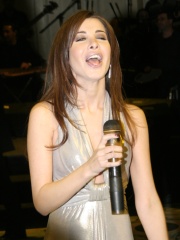
5. Nancy Ajram (b. 1983)
With an HPI of 59.77, Nancy Ajram is the 5th most famous Lebanese Singer. Her biography has been translated into 56 different languages.
Nancy Nabil Ajram (Arabic: نانسي نبيل عجرم, Lebanese Arabic: [ˈnæːnsi ˈʕæʒræm]; born May 16, 1983) is a Lebanese singer and television personality, dubbed by Spotify as the "Queen of Arab Pop". With the support of her father, she began performing as a child and appeared on several television shows in her early years. By the age of 15, Ajram signed a recording contract with EMI and released her debut studio album Mihtagalak (1998). In spite of being under the legal age, Ajram was accepted to the Syndicate of Professional Artists in Lebanon. The following year, she released her second album Sheel Oyoonak Anni (2001). Her breakthrough occurred with the start of her collaboration with well-known Lebanese producer Jiji Lamara, when she released her hit single "Akhasmak Ah"; created by Egyptian composer Mohamed Saad, and third studio album Ya Salam (2003) in which she adopted a more sensual public image while reinventing her music. Ajram's fourth album Ah W Noss (2004) was another commercial success, spawning the chart-topping singles "Ah W Noss", "Lawn Ouyounak", "Oul Tani Keda" and "Inta Eyh", at which point she had established pop icon status in the Middle East. In 2007, Ajram released her first children's album, Shakhbat Shakhabit, which was the most notable and successful work for children at the time. Betfakkar Fi Eih (2008), her sixth album, produced seven singles including the commercially successful Egyptian hits "Betfakkar Fi Eih", "Min Dally Nseek" and the Lebanese single "Mashi Haddi". It won Ajram her first World Music Award for best-selling Middle-Eastern artist, and made her the youngest Arab WMA winner to date. Having sold over 30 million records worldwide as of 2007, Ajram is one of the best-selling Middle Eastern music artists. By 2010 she was announced the best-selling Middle Eastern female singer of the decade (2000–2009). Throughout her career, Ajram has released twelve studio albums to date (including two dedicated for children) and numerous chart toppers such as "Yay", "Ya Tabtab", "Moegaba", "Ehsas Jdeed", "Ibn El Giran", "Fi Hagat", "Ya Kether", "Ma Tegi Hena", "Aam Betaala' Feek", "Badna Nwalee El Jaw", "Salamat", and "Aala Shanak". Ajram is the first and only female spokesperson of Coca-Cola in the Arab world, releasing several promotional Coke anthems that became instant smash-hits, such as "Oul Tani Keda", "El Dounya Helwa", "Noss El Kawn" and "Shaggaa Bi Alamak". Ajram has made the list of Most Powerful Arabs on Arabian Business several times, and was similarly listed by Newsweek as one of the most influential Arab singers. She has appeared in patriotic songs for her country Lebanon, and has also dedicated seven patriotic songs to Egypt; a country she is widely popular in thanks to her Egyptian hits such as "Akhasmak Ah" and "Ah W Noss". Between 2013 and 2017, Ajram served as a judge on MBC's reality talent show Arab Idol. She also began serving as a coach on The Voice Kids Arabia in 2016. In 2020, Nancy was the most-streamed Arab female artist on Spotify, achieving more than 100 million plays of her songs, followed by Lebanese singer Fairuz with 67 million plays.

6. Wadih El Safi (1921 - 2013)
With an HPI of 58.99, Wadih El Safi is the 6th most famous Lebanese Singer. His biography has been translated into 20 different languages.
Wadih El Safi (Arabic: وديع الصافي, romanized: Wadīʿ aṣ-Ṣāfī, born Wadih Francis; November 1, 1921 – October 11, 2013) was a Lebanese singer and composer. Born in Niha, Lebanon, Wadih El Safi started his artistic journey at the age of sixteen when he took part in a singing contest held by Lebanese Radio and was chosen the winner of all categories among 40 other competitors.

7. Fayza Ahmed (b. 1934)
With an HPI of 58.31, Fayza Ahmed is the 7th most famous Lebanese Singer. Her biography has been translated into 17 different languages.
Fayza Ahmed (Arabic: فايزة أحمد; 5 December 1934 – 24 September 1983) was a Lebanese-Egyptian singer and actress of Syrian descent. During her career, she appeared in six films.

8. Maher Zain (b. 1981)
With an HPI of 56.40, Maher Zain is the 8th most famous Lebanese Singer. His biography has been translated into 45 different languages.
Maher Zain (Arabic: ماهر زين; born 16 July 1981) is a Lebanese-Swedish Islamic Nasheeds and R&B singer, songwriter and music producer. He released his debut album Thank You Allah, an internationally successful album produced by Awakening Records, in 2009. He released his follow-up album Forgive Me in April 2012 under the same production company, and a third album One in 2016.

9. Elissa (b. 1972)
With an HPI of 55.50, Elissa is the 9th most famous Lebanese Singer. Her biography has been translated into 38 different languages.
Elissar Zakaria Khoury (Arabic: إليسار زكريا خوري; born 27 October 1971), commonly known as Elissa (Arabic: إليسا), is a Lebanese singer, television personality and businesswoman. Known for her romantic musical style and emotive vocal performances, she has been dubbed as the "Queen of Emotions" by fans and journalists alike. Her musical career began in 1992 when she was featured in the Lebanese talent show Studio El Fan; later being awarded the silver medal. In 1998, she released her debut studio album Baddy Doub through EMI Music Arabia, with the album achieving success. Her second album W'akherta Maak (2000) featured the single "Betghib Betrouh", a duet with Ragheb Alama which achieved commercial success and won accolades. Elissa's breakthrough occurred with her 2002 hit single "Ayshalak", from the third studio album of the same name, which was a substantial commercial success. After signing with record label Rotana, she released the albums Ahla Dounya (2004), Bastanak (2006), Ayami Bik (2007), Tesada'a Bemeen (2009), Asaad Wahda (2012), Halet Hob (2014), Saharna Ya Leil (2016), Ila Kol Elli Bihebbouni (2018) and Sahbit Raey (2020); eventually becoming Rotana's best-selling artist. Elissa is one of the best-selling music artists of the Middle East; selling over 30 million albums throughout her career. She has additionally garnered over 900 million streams on Anghami, making her the most-streamed female artist on the platform, and over 6 billion views on YouTube. In 2005, Elissa became the first Arab artist of Lebanese descent to win the World Music Award for "Best Selling Middle Eastern Artist" in recognition of the sales for "Ahla Dounya", additionally doing so in 2006 and 2010 for "Bastanak" and "Tesada'a Bemeen", respectively. Throughout her career, she has also endorsed numerous brands such as Corum and Pepsi and is also an outspoken women's rights activist; raising awareness on specific subjects such as women's rights in Lebanon and breast cancer awareness through her music and social media platforms.
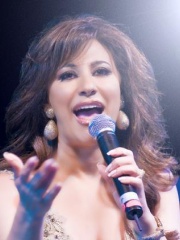
10. Najwa Karam (b. 1966)
With an HPI of 54.94, Najwa Karam is the 10th most famous Lebanese Singer. Her biography has been translated into 30 different languages.
Najwa Karam (Arabic: نجوى كرم; Lebanese Arabic pronunciation: [ˈnaʒwa ˈkaɾam]) is a Lebanese singer, songwriter, producer, and television personality. She has sold over 60 million records worldwide and was recognized as the highest-selling Lebanese artist in 1999, 2008, and 2011. Karam is recognized for her fusion of Mawwal and traditional Lebanese music with contemporary sounds, contributing to the wider adoption of the Lebanese dialect in Arabic music. Karam was featured in the Forbes 2023 "50 Over 50: Europe, Middle East, and Africa" List. Karam continues to perform regularly throughout the Arab world and internationally. In 2011, Karam debuted as a judge on Arabs Got Talent and appeared in all six seasons. In 2020, she served as a coach on the first season of MBC's The Voice Senior. In 2017, Karam placed fifth on Forbes list of "The Top 100 Arab Celebrities". The following year, Cosmopolitan included her among "The 15 Most Inspiring Women In The Middle East", and Forbes named her one of the "Top 10 of Arab Stars On The Global Stage." In 2021, she was featured in Forbes Middle East’s Arab Music Stars list of MENA's 50 most-streamed and followed active musicians. Karam gained widespread recognition in the 1990s, earning the nickname Shams el-Ghinnieh (The Sun of Song) from her eponymous album. Her other successful 90's albums include Naghmet Hob, Ma Bassmahlak, Maghroumeh, and Rouh Rouhi. In 2000, Karam's tenth album, Oyoun Qalbi, became her highest-selling album. In 2001, her album "Nedmaneh" sold millions of copies worldwide, earning Karam a Murex d'Or award for Best Arabic Artist and Rotana Records awards, including Artist of the Year, Album of the Year, and Highest-Selling Album of the Year. By the time her album Saharni was released in 2003, she had established herself as one of the most prominent Arabic singers and a Middle Eastern pop icon. Throughout the late 2000s, Karam's commercial success endured via her albums, Hayda Haki, Am Bemzah Ma'ak, and Khallini Shoufak. Karam frequently worked with renowned musician and composer Melhem Barakat and collaborated with singer, Wadih el Safi, on their 2004 debut titled W Kberna ("We Grow Old Together"). In 2011, Karam collaborated with Sony Entertainment and Rotana to produce Arab World's first 3D music video for her song, "Ma Fi Noum" from her record Hal Layle... Ma Fi Nom. In 2012, Karam walked the Red Carpet at the 65th Cannes Film Festival. She has since released multiple singles and music videos, as well as her latest studio album, Menni Elak, in 2017. In 2019, Karam's single, "Maloun Abou L Echeq," became a commercial and critical success, with its music video becoming one of the highest-viewed Arabic music videos on YouTube.
People
Pantheon has 21 people classified as Lebanese singers born between 1921 and 1983. Of these 21, 17 (80.95%) of them are still alive today. The most famous living Lebanese singers include Fairuz, Gazebo, and Layal Abboud. The most famous deceased Lebanese singers include Sabah, Wadih El Safi, and Fayza Ahmed. As of April 2024, 2 new Lebanese singers have been added to Pantheon including Carole Samaha, and Karl Wolf.
Living Lebanese Singers
Go to all RankingsFairuz
1935 - Present
HPI: 72.84
Gazebo
1960 - Present
HPI: 63.99
Layal Abboud
1982 - Present
HPI: 63.68
Nancy Ajram
1983 - Present
HPI: 59.77
Maher Zain
1981 - Present
HPI: 56.40
Elissa
1972 - Present
HPI: 55.50
Najwa Karam
1966 - Present
HPI: 54.94
Julia Boutros
1968 - Present
HPI: 53.92
Myriam Fares
1983 - Present
HPI: 51.74
Cyrine Abdelnour
1977 - Present
HPI: 48.31
Nawal Al Zoghbi
1971 - Present
HPI: 48.13
Carole Samaha
1972 - Present
HPI: 47.84
Deceased Lebanese Singers
Go to all RankingsSabah
1927 - 2014
HPI: 63.83
Wadih El Safi
1921 - 2013
HPI: 58.99
Fayza Ahmed
1934 - Present
HPI: 58.31
Suzanne Tamim
1977 - 2008
HPI: 47.60
Newly Added Lebanese Singers (2025)
Go to all RankingsOverlapping Lives
Which Singers were alive at the same time? This visualization shows the lifespans of the 3 most globally memorable Singers since 1700.

